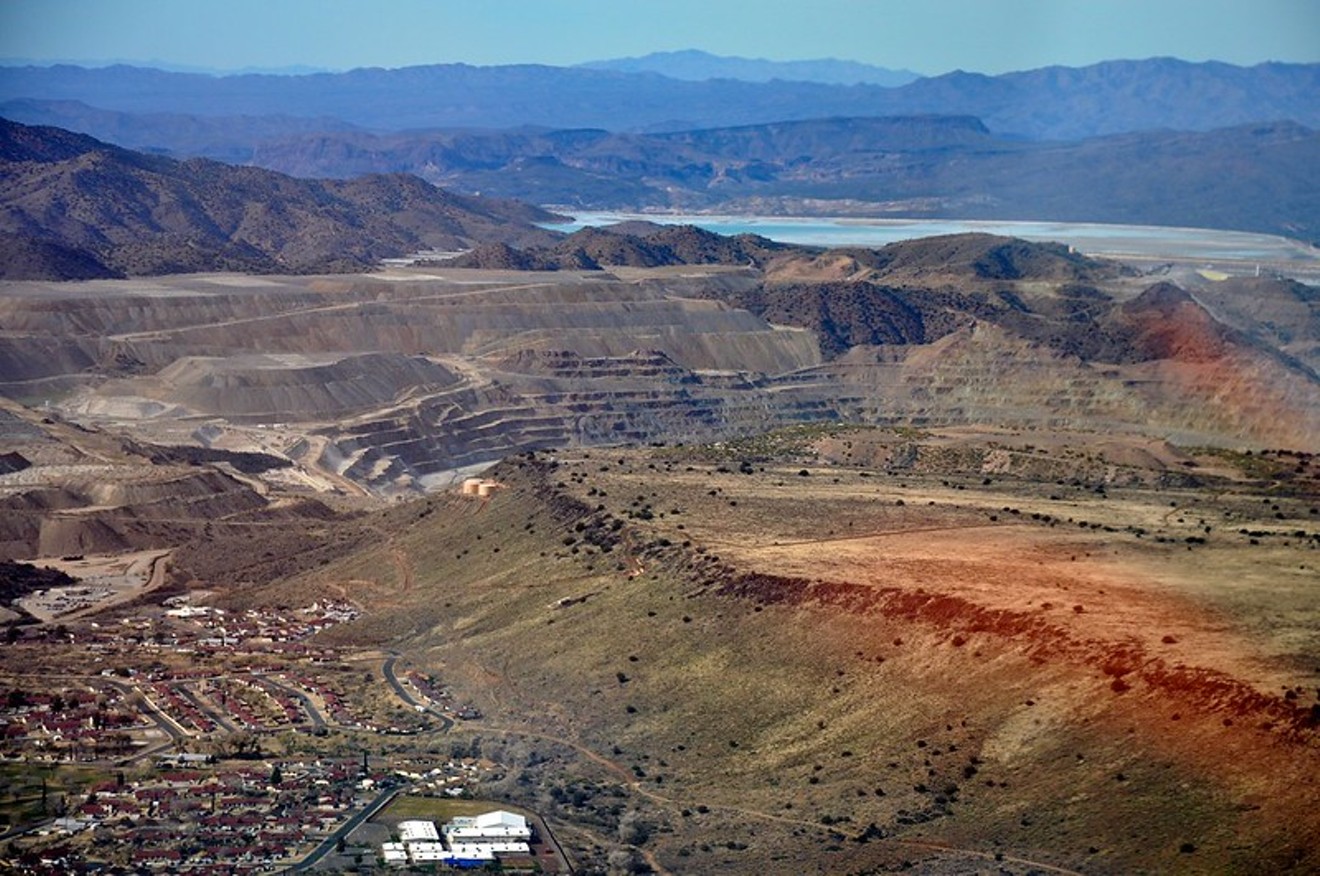The nearly 17,000 acres of Arizona State Trust land sold to the copper mining company Freeport-McMoRan this month holds historical significance for several tribes.
As first reported by Phoenix New Times, the Phoenix-based Freeport-McMoRan purchased the land on January 6 for about $13.5 million. The company plans to use the property to store tailings, the toxic, sludgy byproduct of mining.
Covering about 25 square miles of nearly untouched desert landscape, the company's purchase area overlaps with land that holds significance for 11 Native American tribes, according to a map maintained by the State Historic Preservation Office.
Among them: Chemeheuvi Indian Tribe, Colorado River Indian Tribes, Fort McDowell Yavapai Nation, Fort Mohave Indian Tribe, Hopi Tribe, Hualapai Tribe, Navajo Nation, Pueblo of Zuni, Salt River Pima-Maricopa County Indian Community, Yavapai Apache Nation, and Yavapai Prescott Indian Tribe
State antiquity policies require public agencies to "consult with tribes on all actions or policies that have the potential to affect tribal communities or its members."
Hopi, Hualapai, and Yavapai-Prescott responded to letters from the state about Freeport-McMoRan's plans, according to Lisa Atkins, the commissioner of the State Land Department. Hualapai and Yavapai-Prescott conducted site visits, Atkins said.
"This auction is publicized statewide and locally, and done in consultation with the State Historic Preservation Office related to indigenous archaeological sites," Atkins said in an email five days after New Times sent initial questions. "This sale includes a substantial cash bond to secure compliance on preservation of the archaeological sites."
According to a notice of auction for the property, researchers have identified 65 archaeological sites on the land, including 57 that are eligible for listing on the Arizona Register of Historic Places. Freeport-McMoRan has drafted a plan to mitigate damage to sites and has deposited $500,000 with the State Land Department to ensure that it complies with state antiquities law.
But some researchers say evaluations of archaeological sites, which typically focus on historical significance and the potential for excavation, do not typically factor spiritual or cultural significance tied to landscapes.
As Peter Bungart, an archaeologist for the Hualapai Tribe, wrote in a 2016 peer-reviewed article with lead researcher Dean Saugee, the historical significance of a site from a tribal perspective, "as embodied in stories and songs," does not always comport with the broader public imagination.
"Archaeological sites may be acknowledged to be associated with or significant to extant tribes, but even when they are, in our experience land managers do not often give serious consideration to the possibility that tribes may value these sites for their information potential through other methods other than excavation," Saugee and Bungart wrote.
The property purchased by Freeport-McMoRan sits south of the Hualapai Tribe's current reservation around Peach Springs. But as with other aboriginal hunting and gathering societies, the Hualapai's ancestral homeland includes some of the land bought by the company.
Bungart declined to comment for this story. Through a spokesperson, Hualapai chairman Damon Clarke said he does "not have a comment at this time."
None of the other 10 tribes contacted by New Times on Monday and Tuesday responded to a request for comment, either.
Freeport-McMoRan frequently engages in philanthropy related to Native American issues, including donations to business training programs, community activities, and scholarships.
One native lawmaker publicly commented on the land purchase after New Times reported on the deal.
"Tribal consultation done?" tweeted State Senator Jamescita Peshlakai, who is a member of the Navajo Nation. Peshlakai did not respond to request for comment.
Freeport-McMoRan did not respond to request for comment.
[
{
"name": "Air - MediumRectangle - Inline Content - Mobile Display Size",
"component": "18478561",
"insertPoint": "2",
"requiredCountToDisplay": "2"
},{
"name": "Editor Picks",
"component": "16759093",
"insertPoint": "4",
"requiredCountToDisplay": "1"
},{
"name": "Inline Links",
"component": "17980324",
"insertPoint": "8th",
"startingPoint": 8,
"requiredCountToDisplay": "7",
"maxInsertions": 25
},{
"name": "Air - MediumRectangle - Combo - Inline Content",
"component": "16759092",
"insertPoint": "8th",
"startingPoint": 8,
"requiredCountToDisplay": "7",
"maxInsertions": 25
},{
"name": "Inline Links",
"component": "17980324",
"insertPoint": "8th",
"startingPoint": 12,
"requiredCountToDisplay": "11",
"maxInsertions": 24
},{
"name": "Air - Leaderboard Tower - Combo - Inline Content",
"component": "16759094",
"insertPoint": "8th",
"startingPoint": 12,
"requiredCountToDisplay": "11",
"maxInsertions": 24
}
]











